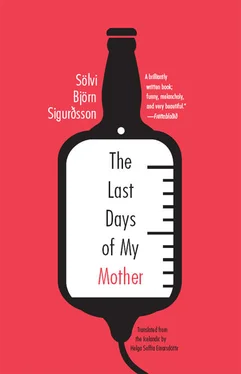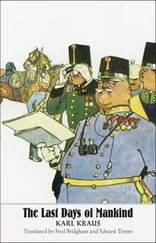“He does look a bit like him. But he’s gone back to Highland for a nap. He needs a lot of sleep these days, poor Duncan.”
“Eva is getting stoned anyway with Tim somewhere out there. She’s in high spirits. Frederik thinks she might recover.”
“That’s great news.”
“I’m not sure how this’ll all end — the way she’s going she’ll end up in a reggae band with Tim before fall.”
She laughed and said that this really was some trip, and how lovely it was of me to do this for my mother.
“Don’t we have to try and avoid messing it up for those closest to us?”
“Perhaps. I’ll get back to you on it next time.”
We said good-bye and I went to fetch Mother while Ramji got ready to drive us back to the city.
“Why would you want to leave so early, Trooper? I just don’t get it. Tim and I have decided to go clubbing together soon.”
“Congratulations.”
“You’re welcome to come with us, Trooper, if you think you have the stamina and stomach for it.”
“Which I’m not sure I do, Eva.”
It was just past noon when we sailed into town. Mother’s veins were great rivers of happiness and it was only a matter of deciding what course they should take. Finally, she announced that the great time had come: Shopping Day. She had decided that the two of us should celebrate the miracle of Ukrain by finding a mall.
The decision didn’t come as a surprise — we’d wandered into shops almost every day since we arrived in Amsterdam, buying earrings, scarves, handbags, gold-plated teaspoons with insignia, and little, carved wooden cups. I had been expecting this, but the determination in her voice and the intensity of emotion rattled me. Until now our casual shopping had been nothing more than an easy warm-up exercise, a local tournament in small sales compared to the Olympic credit card swiping we had in store. Each day had its special meaning — we’d already had Museum Day, Pub Day, Canal Day, and other similar days that differed from the days with visits to museums, pubs, and canals by being solely and solemnly devoted to museums, pubs, and canals — but Shopping Day, according to Mother’s detailed journal, had not yet come to pass. It was time.
I knew how futile it was to point to all the merchandise building up in her hotel suite. Little, random bargains were ineffective in appeasing the landslide of emotions coursing through Mother’s blood. If we were to have a Shopping Day we had to devote at least five hours in a mall to it, then head for Rembrandtplein to get good and drunk before taking on the charming little boutiques in the old town.
“I would expect that it’s a great experience to go to a mall here. The Dutch really know their business,” she said, as if the highest goal of every object was to get into a shopping bag. She had been a shopaholic ever since I could remember, especially when it came to sales. Her principles of prudence were connected to her deeply contemplative insight into Western consumerism, the river of impoverishment in which modern marketing wanted to drown people by convincing them that designer goods were superior to others. In Mother’s mind, people who frequented specialty shops were devoid of any instinct of self-preservation. Or maybe it was en vogue these days to throw your wallet straight on the bonfire? Was that the smartest fuel these days? Was that what they wanted, these affected, thin men on all those ridiculous lifestyle shows?
Mother felt that one of the best virtues was to have a good eye for a bargain. She didn’t mind if others, especially he-males, wanted to be a bit extravagant, pull out a Kruger ’85 for instance and call for a taxi to bring them caviar. But there was a completely different approach in the domestic bookkeeping on Spítala Street. There, everything was about sorting credit card receipts from liquidations, bargain weekends at the flea market, and 2-for-1 trips to Tiger. Due to the incredible range of products available in these places, Mother could easily convince herself that she needed the most arbitrary things, like an electric can opener (Tiger: 600 krónur), a freestanding partition wall with erotic carvings (flea market: 24,000 krónur), and woolen upholstery for a car (neither place, nor price of purchase disclosed). All she needed was the car. She said I would probably thank her later: it would be nice to have extra upholstery when it got colder, it was something anyone who’d ever had a car knew, and she really thought it was quite extraordinary to have a grown man in the house and still have to go everywhere in taxcabs. I had adamantly refused to drive her around on her bargain hunts, telling her that it was the toxoplasmosis talking.
Toxoplasmosis was a disease that had frightened Mother when she first heard about it. I read her an article from a magazine shortly after I got back from Ireland. The article recounted the story of Alda Gudnadóttir, a respectable housewife who had taken diligent care of hearth and home for decades, when she suddenly became obsessed with buying consumer goods. She wanted new furniture, a new car, new clothes, even a new man, and mingled with this craving for new stuff was the pleasure she found in playing on the strings of economy. Then one day, Alda had to live with her decision of firing the help after investing in industrial cleaning products for one and a half million krónur. She had to admit to having a problem. She went to the doctor and guess what: she was suffering from toxoplasma infection!
The disease was due to a little parasite that infected the brain, causing middle-aged women to develop Crazy Cat Lady Syndrome and turn into turbulent shopaholics. Other symptoms were increased risk-taking, impulsiveness, and other effects reminiscent of having had a drink or two. Alda was treated with antibiotics and a mild sedative that brought her back to the planes of tranquility and reason. Mother, however, who, of course, suffered from this very illness as I suspected, was depressed over the news for three days until the wonderful and obvious dawned on her: She wasn’t the one making unreasonable decisions. It was the parasite.
In a flash, Mother saw her financial fiascos in new light. She admitted that an overdraft of three million was quite steep, and she was grateful to me for getting her out of that pit, but when all was said and done I was in fact the one to blame for her supermarket weakness. Wasn’t it I who brought Ignatius into the home all those years ago? Left him there with her when I took off and had fun with spray cans abroad? Her doctor was sure the infection came from the cat.
I plead guilty as charged, of course. The fact of the matter was that Mother was not at all displeased with her toxoplasmosis; she just wanted it to be crystal clear who was to blame when she returned from a trip into town with a seventy-thousand krónur, 100 % silk pashmina. The infection was a bonus. In addition to being slightly tipsy, just at heart — was there anything as good? She’d never heard anything as absurd as getting treatment and laughed at Alda Gudnadóttir. Instead, Mother kept on purchasing: corporate staplers, necklaces, wine racks, little voodoo dolls, a tea table. To throw something away was as bad a missing out on a good bargain.
No sooner had we said good-bye to Ramji and walked into the mall, an overwhelming perfumery a few miles out of the city center, than I was saddled with a golden handbag adorned with fake pearls. Mother refused to take a bag, finding the suggestion ludicrous — putting a bag into a bag — and since she was already carrying her trusted, old purse, I was doomed to carry the new one. It didn’t take long to fill it with all sorts of purchases, such as a sixteen-pound lead mobile she intended to hang from the ceiling above her bed. I tried to argue, suggesting it would upend the Feng Shui of the room. But she was no greenhorn. She knew her stuff when it came to interior design and organization. I handed over my credit card and stuffed the damn mobile into the bag.
Читать дальше












